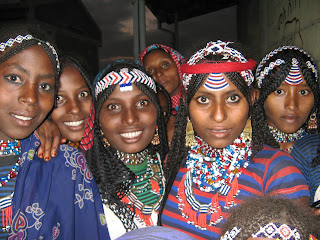
Again it was going to be a long travel day. Our destination was the holy city in the north called Lallibela. But before leaving the area we wanted to visit the site of a second water weir / diversion project that was currently under construction.
So we packed our things, ate a breakfast of injera, scrambled eggs and goat, said our goodbyes and headed out onto the dusty dry desert.
Some ten or so kilometers from the camp we suddenly came upon the most wondrous hives of activity. Under 

It’s hard to describe what this looked like, and the pictures don’t do it justice. Men, women and children, digging, hauling, mixing, pounding, crushing, piling, dragging… It looked like a chaos of 

Again, the tribe organizes itself to send roughly half its people to the worksite – the work is paid for in food (6 kilos of grain per person, per day – provided by Canadian Foodgrains Bank) while the remainder of the tribe cares for the animals. So the very real need for food today and food security for tomorrow is combined to meet
The energy of this work site was awesome and exhilarating. We had planned to only stop for a quick visit and ended up staying for several hours.

Irrigation ditch leading away from the river.
Leaving the desert we came to a washed out bridge in the road and had to cross the now dry river bed about a hundred meters upstream. This bridge had been destroyed by a flash flood only two weeks earlier. This gives you an idea of the volatility of the environment here.

I think I mentioned in a previous post that the reason the Afar people have to adopt agriculture (rather than rely solely on their traditional pastoralist way of life) is that climate change has dramatically increased the frequency of drought in a region that is already rather dry and barely able to provide food to sustain it’s inhabitants. Having been back now from
I read a paper recently by Walter Brueggemann , a tremendous contemporary theologian, who argues that the persistence of hunger in a world entirely capable of producing enough food for all, in the end, is an issue of fidelity; a fidelity that issues from a three-way covenant between God, the earth, and its people. For our part, our covenant is to a love-fueled justice –one that is binding not in the remote, legal sense, but rather in the familial sense. In other words, I don’t share a table with my wife and children because I am legally bound to do so, or because of an intellectual consent to an external notion of egalitarian justice. I share a table because I adore them. I’m just happy to be there with them. Charity is not a result of do-goodism, it is the offspring of cherishing, that is… love. But love puts claims on both the lover and the beloved. And I can’t authentically proclaim my love and continue to willfully live in a way that brings harm to those I cherish.
I guess I am beginning to understand that charity is not simply giving from “my” excess to another’s pitiful need. At the supper table, I don’t think myself generous when my children load their plates with food. We don’t do that kind of math at all. We eat, we laugh, we tell stories as we subtly, mutually (unconsciously) negotiate our life together. True charity is about coming to the table, with all God’s children and celebrating responsibly and joyfully the gift of creation that is God’s good gift to all. It’s a very different way of thinking about possessions and entitlement and all the assumptions that make the capitalist world go ‘round.
Sorry…. I’m rambling.
We left the Afar around

Those are my sunglasses!










































